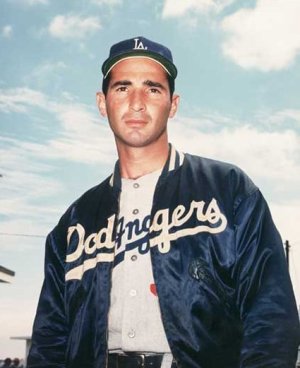
From 1962 until 1966, Sandy Koufax was one of the greatest pitchers to ever pitch in the game. During that 5-year period, he recorded 111 victories and only 34 losses, led the league in ERA each season (averaging under two earned runs per game), paced the National League in strikeouts ,(1963, 1965, and 1966) ,and shutouts (three times), and pitched four no-hitters, including a perfect game in 1965. He was a recipient of the Cy Young Award in 1963, 1965, and 1966 ( the first 3-time Cy Young Award winner in baseball history) , all by unanimous vote and during an era when only one pitcher was chosen per season.
The 1961 season marked the beginning of Koufax's dominant streak, a period in which he would be an All-Star selection six times (1961-1966), and would lead the Dodgers to two World Series Championships in 1963 and 1965, being named the World Series Most Valuable player in both series. On September 9, 1965, Koufax became the sixth pitcher of the modern era to throw a perfect game, the first by a left-hander since 1880. The game was Koufax's fourth no-hitter, setting a Major League record. Koufax struck out 14 batters, the most recorded in a perfect game.
At the age of 30, due to extreme arthritis in his pitching arm, Koufax decided to retire. In his 12-season career, Koufax had a 165-87 record with a 2.76 ERA, 2, 396 strikeouts, 137 complete games, and 40 shutouts. He was the 2nd pitcher in baseball history to have two games with 18 or more strikeouts, and the first to have eight games with 15 or more strikeouts.
Retiring at the peak of his career, he became, at age 36 and 20 days, the youngest player ever elected to the Baseball Hall of Fame. The Sporting News ranked Koufax number 26 on its list of "The 100 Greatest Baseball Players". He was also one of 30 players named to the Major League Baseball All-Century team that same year.
Koufax is also remembered as one of the most outstanding Jewish athletes in American sport. His decision not to pitch Game 1 of the 1965 World Series because it fell on Yom Kippur received national attention as an example of conflict between social obligations and his own personal beliefs.